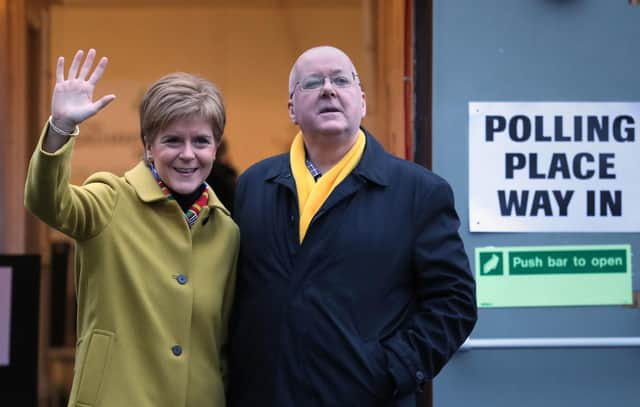We need fresh Holyrood elections and we need them now - Brian Monteith


There is no doubt Peter Murrell had to go. The question is why he was not forced out sooner? The answer to that question reveals just how rotten and shameless Scottish politics has become.
As I argued here in the past, you cannot seek a mandate to instigate action when you do not have the authority empowering you to deliver said promise. Such was the case with Sturgeon’s promise to hold a second referendum.
Advertisement
Hide AdAdvertisement
Hide AdWhatever mandate Nicola Sturgeon believed she had to deliver a referendum this October was shown to be worthless. Any new leader will have even less authority.
Why then has Peter Murrell gone now?
The answer is proffered he had broken trust among sections of the media who had previously taken his word, or that of his agents, as being unimpeachable. I have to say I find this mystifying. Frankly the SNP has been pumping out highly dubious “facts” for more than a decade and all of that time Peter Murrell has been responsible by running the party machine.
Those elected SNP politicians around him simply came and went through the revolving door, exiting and entering often more than once, forgetting what they might have said in the past and defending any new arguments even if they contradicted the supposed “truth” they espoused previously.
The idea Peter Murrell suddenly developed a moral conscience once found to be holding back the real party membership numbers is not the real reason. The explanation is simple, when Mrs Murrell, Nicola Sturgeon to you and I, announced her resignation as party leader and therefore First Minister she set in train a series of events that have eventually forced Mr Murrell out of his post. Nicola Sturgeon’s legacy includes her husband’s rushed departure.
By instigating a clearly unplanned leadership election on SNP MSPs – and without an obvious successor lined up and ready to sweep away with sh ock and awe any competition – Sturgeon’s own record in government was suddenly put in play.
From the get-go the candidacy of Ash Reagan was bound to question Sturgeon’s tactic of pushing her gender recognition reforms as part of means to differentiate a new Scotland from the stubbornly conservative United Kingdom.
Any new SNP leader and First Minister would have to decide if Sturgeon’s record should be defended or, by recognising its many failures, be used as the means to reboot the SNP so it could be re-elected in 2026. Reagan had no alternative, but Kate Forbes had a choice and bravely chose to take the route of observable truth around SNP failures as her means to create distance with Humza Yousaf, the only cabinet member willing to defend Sturgeon’s legacy.
Sturgeon should have known Yousaf was always a high stakes gamble. As the “continuity candidate” his record over the lifeline ferries – to dinner table Hate Crimes – and NHS backlogs – was not the continuity any ambitious politician would normally want to crow about.
Advertisement
Hide AdAdvertisement
Hide AdAnd if Peter Murrell is the great political strategist, as many in the SNP claim, he would undoubtedly have seen the loss of husband and wife control as presenting an existential risk. Best not relying on Humza Yousaf then.
With the ballot opening last Monday the question of who exactly had a vote became crucial, and reports started to surface of former members being given a vote and the size of the franchise being a tad elastic. Denying the membership had fallen by some 30,000 since the last publication of figures and 50,000 since the last general election became a lie too far. But it was only because both Forbes and Reagan kicked-off about possible gerrymandering and were willing to bring the whole election into question did the SNP’s National Executive Committee finally decided it should consider Peter Murrell’s position.
This is what happens in collapsing autocracies – the loyalty to the discipline of the herd can dissipate very quickly as each apparatchik looks to survive. Saving their reputation, their pension or simply settling a few old scores becomes the imperative. Whatever it was, Sturgeon’s resignation led directly to the SNP NEC deciding Murrell had become a liability.
It is not over yet, however. There will be more SNP figures found wanting when confronted with a variety of policy or party decisions that seem inexplicable. Already Mike Russell, Party President and now acting CEO, is claiming he did not know key decisions about membership numbers. Just like Mrs Murrell did not know any details when questioned on the loan of £107,000 by Mr Murrell to the SNP.
We have not even begun to discuss the ongoing police investigation to possible fraud around £600,000 – meant to be ring-fenced for the next referendum but unaccounted for.
This election of an SNP leader in such circumstances cannot be the way to saddle the Scottish public with a new First Minister. The SNP is now itself in the dock. “Meet the new boss, same as the old boss” might be fitting for Cuba or North Korea but is cannot be right for Scotland’s supposed new devolved democracy.
Calling a Scottish election immediately must be the platform of any new First Minister if she, he, it or they is to have any credibility in claiming a mandate from the Scottish people. Let the electorate decide who should be trusted to form the Government and what the priorities of a Scottish Parliament should be.
Brian Monteith is a former member of the Scottish and European Parliaments and Editor of ThinkScotland.org
Comments
Want to join the conversation? Please or to comment on this article.
